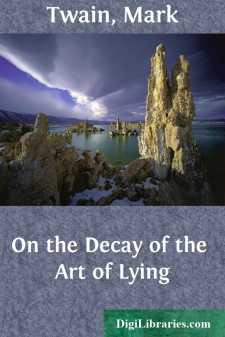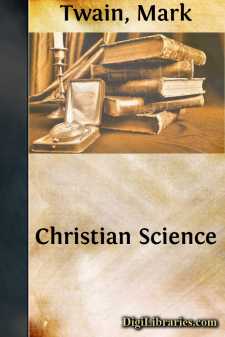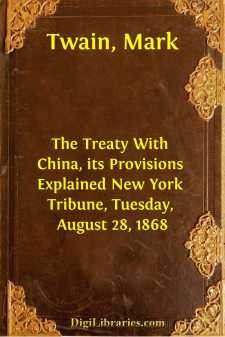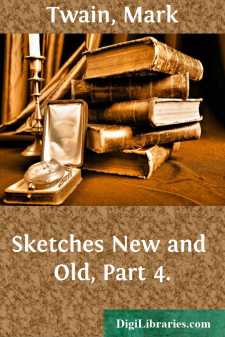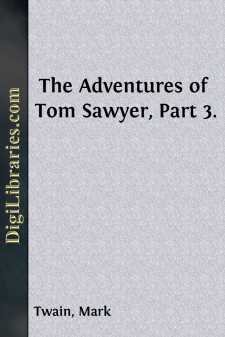Categories
- Antiques & Collectibles 13
- Architecture 36
- Art 48
- Bibles 22
- Biography & Autobiography 815
- Body, Mind & Spirit 144
- Business & Economics 28
- Children's Books 18
- Children's Fiction 14
- Computers 4
- Cooking 94
- Crafts & Hobbies 4
- Drama 346
- Education 58
- Family & Relationships 59
- Fiction 11833
- Games 19
- Gardening 17
- Health & Fitness 34
- History 1378
- House & Home 1
- Humor 147
- Juvenile Fiction 1873
- Juvenile Nonfiction 202
- Language Arts & Disciplines 89
- Law 16
- Literary Collections 686
- Literary Criticism 179
- Mathematics 13
- Medical 41
- Music 40
- Nature 179
- Non-Classifiable 1768
- Performing Arts 7
- Periodicals 1453
- Philosophy 65
- Photography 2
- Poetry 896
- Political Science 203
- Psychology 44
- Reference 154
- Religion 515
- Science 126
- Self-Help 85
- Social Science 82
- Sports & Recreation 34
- Study Aids 3
- Technology & Engineering 59
- Transportation 23
- Travel 463
- True Crime 29
Mark Twain
Mark Twain, born Samuel Langhorne Clemens in 1835, was a prominent American author and humorist known for his sharp wit and keen observations on human nature. He gained fame for his classic novels "The Adventures of Tom Sawyer" and "Adventures of Huckleberry Finn," which are celebrated for their vivid depictions of life along the Mississippi River and their incisive commentary on social issues. Twain's storytelling prowess and his ability to blend humor with critical social commentary have solidified his place as one of the most influential figures in American literature.
Author's Books:
Sort by:
by:
Mark Twain
Observe, I do not mean to suggest that the custom of lying has suffered any decay or interruption—no, for the Lie, as a Virtue, A Principle, is eternal; the Lie, as a recreation, a solace, a refuge in time of need, the fourth Grace, the tenth Muse, man's best and surest friend, is immortal, and cannot perish from the earth while this club remains. My complaint simply concerns the decay of the...
more...
by:
Mark Twain
CHAPTER I VIENNA 1899. This last summer, when I was on my way back to Vienna from the Appetite-Cure in the mountains, I fell over a cliff in the twilight, and broke some arms and legs and one thing or another, and by good luck was found by some peasants who had lost an ass, and they carried me to the nearest habitation, which was one of those large, low, thatch-roofed farm-houses, with apartments in...
more...
by:
Mark Twain
EXTRACTS FROM ADAM'S DIARY Translated from the original MS. by Mark Twain [NOTE.—I translated a portion of this diary some years ago, and a friend of mine printed a few copies in an incomplete form, but the public never got them. Since then I have deciphered some more of Adam's hieroglyphics, and think he has now become sufficiently important as a public character to justify this...
more...
by:
Mark Twain
ARTICLE I.His Majesty, the Emperor of China, being of the opinion that in making concessions to the citizens or subjects of foreign Powers of the privilege of residing on certain tracts of land, or resorting to certain waters of that Empire for the purposes of trade, he has by no means relinquished his right of eminent domain or dominion over the said land and waters, hereby agrees that no such...
more...
by:
Mark Twain
This party was one of those persons whom they call Philosophers. He was twins, being born simultaneously in two different houses in the city of Boston. These houses remain unto this day, and have signs upon them worded in accordance with the facts. The signs are considered well enough to have, though not necessary, because the inhabitants point out the two birthplaces to the stranger anyhow, and...
more...
by:
Mark Twain
CHAPTER XXXI. THE BURIED CITY OF POMPEII They pronounce it Pom-pay-e. I always had an idea that you went down into Pompeii with torches, by the way of damp, dark stairways, just as you do in silver mines, and traversed gloomy tunnels with lava overhead and something on either hand like dilapidated prisons gouged out of the solid earth, that faintly resembled houses. But you do nothing the kind. Fully...
more...
by:
Mark Twain
TOM dodged hither and thither through lanes until he was well out of the track of returning scholars, and then fell into a moody jog. He crossed a small "branch" two or three times, because of a prevailing juvenile superstition that to cross water baffled pursuit. Half an hour later he was disappearing behind the Douglas mansion on the summit of Cardiff Hill, and the school-house was hardly...
more...
by:
Mark Twain
CHAPTER XXI. IT was after sun-up now, but we went right on and didn't tie up. The king and the duke turned out by and by looking pretty rusty; but after they'd jumped overboard and took a swim it chippered them up a good deal. After breakfast the king he took a seat on the corner of the raft, and pulled off his boots and rolled up his britches, and let his legs dangle in the water, so as to...
more...
by:
Mark Twain
CHAPTER XLI THE INTERDICT However, my attention was suddenly snatched from such matters; our child began to lose ground again, and we had to go to sitting up with her, her case became so serious. We couldn't bear to allow anybody to help in this service, so we two stood watch-and-watch, day in and day out. Ah, Sandy, what a right heart she had, how simple, and genuine, and good she was! She...
more...
by:
Mark Twain
AN ENCOUNTER IN THE DARK London—to a slave—was a sufficiently interesting place. It was merely a great big village; and mainly mud and thatch. The streets were muddy, crooked, unpaved. The populace was an ever flocking and drifting swarm of rags, and splendors, of nodding plumes and shining armor. The king had a palace there; he saw the outside of it. It made him sigh; yes, and swear a...
more...


